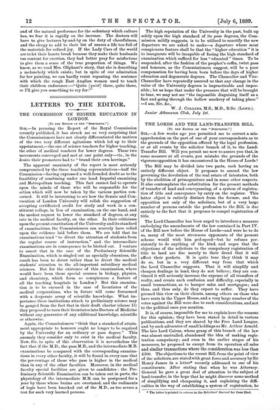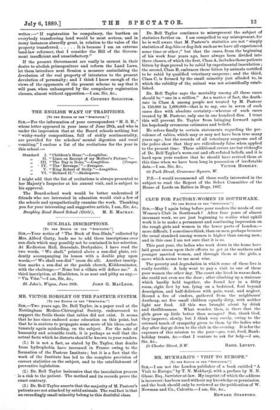THE LORDS AND THE LAND-TRANSFER BILL.
[To THE EDITOR OF TUB " SPECTATOR...1 SIR,—A few weeks ago you permitted me to correct a mis- apprehension on the part of one of your correspondents as to the grounds of the opposition offered by the legal profession, or at all events by the solicitor branch of it, to the Land- Transfer Bill. Will you permit me now to assure you that, in some measure at all events, you mistake the grounds of the vigorous opposition it has encountered in the House of Lords ?
The Bill may be divided into two parts, each having an entirely different object. It proposes to amend the law governing the devolution of the real estate of intestates, both by the abolition of primogeniture and in some other respects. It also contemplates the substitution for the present methods of transfer of land and conveyancing, of a system of registra- tion of title and conveyance by entry on the register. This latter object is entirely distinct from the former, and the opposition not only of the solicitors, but of a very large number of persons outside the profession to the Bill, is due entirely to the fact that it proposes to compel registration of title.
The Lord Chancellor has been urged to introduce a measure embodying the amendments of the law contained in Part IV. of the Bill now before the House of Lords—and were he to do so, many of the most strenuous opponents of the present scheme would wish him god-speed—but he refuses per- sistently to do anything of the kind, and urges that the objections of the solicitors to the compulsory registration of title to land are due merely to their dread that it will affect their pockets. It is quite true they think it may do so, but in a very different way from that which the Lord Chancellor suggests. That it will simplify and cheapen dealings in land, they do not believe; they are con- vinced it will seriously increase the expense of all transfers of realty, and create such confusion and difficulty, especially in small transactions, as to hamper sales and mortgages ; and thus, and thus only, do they expect to suffer. They have pressed this view on their clients, among others on those who have seats in the Upper House, and a very large number of the votes against the Bill were due to such considerations, and not to the political ones you mention.
It is, of course, impossible for me to explain here the reasons for this opinion; they have been stated in detail in various publications, and they are shared by the Free Land League, and by such advocates of small holdings as Mr. Arthur Arnold. The late Lord Cairns, whose grasp of this branch of the law was almost unrivalled, abandoned the idea of making regis- tration compulsory; and even in the earlier stages of his measures, he proposed to except from its operation all sales
and similar transactions where the consideration was less than
2300. The objections to the recent Bill, from the point of view of the solicitors, are stated with great force and accuracy by Sir Henry James in a letter* recently addressed to one of his constituents. After stating that when he was Attorney- General he gave a great deal of attention to the subject of land-transfer, in the hope that he might discover some method of simplifying and cheapening it, and explaining the diffi- culties in the way of establishing a system of registration, he
• The letter is printed in extenso in the Solicitors' .Tounutt for dune 22nd.
writes :—" If registration be compulsory, the burthen on everybody transferring land would be most serious, and in many instances absurdly great, in relation to the value of the property transferred. It is because I am an extreme land-law reformer, that I consider the Bill of the Govern- ment insufficient and unsatisfactory."
If the present Government are really in earnest in their desire to abolish primogeniture and reform the Land Laws, let them introduce next Session a measure assimilating the devolution of the real property of intestates to the present devolution of personalty; and I think I know enough of the views of the opponents of the present scheme to say that it will pass, when unhampered by the compulsory registration clauses, almost without opposition.—I am, Sir, &c., A COUNTRY SOLICITOR.











































 Previous page
Previous page